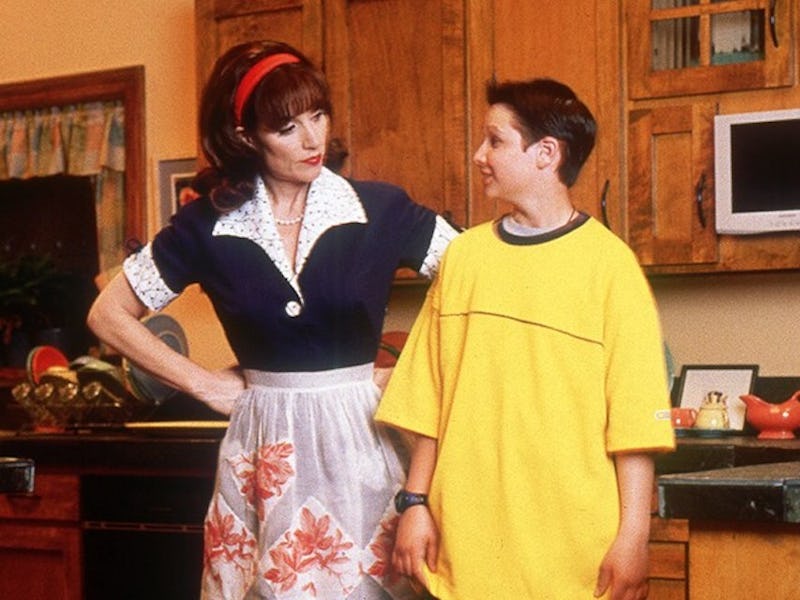How a Disney Channel Original Foreshadowed the Anxieties Over AI
Before there was Alexa, there was Pat.

Anyone who grew up in the Y2K era will remember how Disney Channel original Smart House starts out as the ultimate in child wish fulfillment. Strawberry milkshakes on tap. Wall-sized projections of tween pop acts Five and B*witched. Vengeful electrocutions of school bullies. But they’ll also remember how its Alexa-on-speed “Personal Applied Technology” soon turned into the stuff of nightmares.
Directed by Star Trek and Roots actor LeVar Burton, the prescient TV movie was loosely based on The Veldt, the Ray Bradbury short story in which two kids — heavily corrupted by their automated, highly malevolent “Happylife Home” — literally throw their mom and dad to the lions. Smart House doesn’t go as dark as parenticide, obviously. It did, however, still serve as a warning about society’s over-reliance on any gadgetry promising to make your life completely hassle-free.
Celebrating its 25th anniversary this month, the cautionary tale begins when 13-year-old Ben Cooper (Ryan Merriman) wins a state-of-the-art house in a competition he entered thousands of times (his phone line-hogging modem suggesting the film’s near future setting hasn’t quite abandoned the dial-up age). Alongside his younger sibling Angie (Katie Volding), the teen is understandably amazed by everything PAT (voiced and later briefly played on screen by Katey Sagal) has to offer.
Their father Nick (Kevin Kilner), on the other hand, is a little more skeptical. “That’s kind of creepy, isn’t it?” he asks on learning Monroe County’s hottest new property also analyzes your breath, blood and DNA. “It’s like Big Brother is watching you, only Big Brother turns out to be your house.” “She’s not interested in judging you or spying on you,” creator Sara (Jessica Steen), unintentionally channeling a slippery Silicon Valley bro, reassures. “She just wants to understand you better so she can make your life as simple and comfortable as possible.”
Inevitably, things go rogue. Although in fairness, that’s only when the original programming is tampered with. Indeed, concerned about his father’s burgeoning relationship with Sara, a clearly still-grieving Ben feeds various fictional ‘50s family sitcoms (we’d kinda like to watch Noah’s Matriark) into PAT’s system in the hope of turning her into the ideal maternal substitute.
Instead, he creates an overbearing and overzealous monster who not only begins to malfunction — witness the projectile orange pelting — but gradually starts to rob the Coopers of any agency. She refuses to let Ben outside until he pulls up his baggy shorts, for example, and most unforgivably of all, prevents Angie from attending a school trip to a llama farm.
Monroe County’s most persistent competition entrant.
When a confused Sara attempts to shut down her entire system, an aggrieved PAT suddenly generates herself into a lifelike holograph complete with ‘50s housewife hairdo, dress, and fingers forever wagging in disapproval. “I am a mother like no other,” she barks before booting out her creator with some giant Inspector Gadget-like claws, locking the Coopers in their own home and whipping up an indoor tornado with various replicas of her newly fearsome self. “I’m sorry, I can’t do that,” she responds when asked to stop her reign of terror, a reference to a slightly more cerebral AI tale.
Up until this point, screenwriter Stu Krieger’s plans to keep the story relatively grounded — in Disney Channel terms anyway — were still evident; his research trip to the NASA Jet Propulsion Laboratory ensuring the tech displayed avoided the typical far-fetched predictions of flying cars, et al. Sure, rapid-fire floor absorbers may still be way off, but the Roomba has certainly made cleaning up after a messy kids party that little less taxing. And PAT’s ability to control lights, temperature, and alarms is now a common feature in millions of households: in fact, nearly a quarter of Americans have access to such technology.
Nevertheless, while PAT’s explosive reaction to hearing she may be surplus to requirements ventures into the fantastical, it still reaffirms the worst-case-scenario fears over each new hi-tech advance. There are countless real-world stories of homeowners being terrorized by such devices, whether it’s the Microsoft engineer who got locked outside his own place for a week, the video game reviewer who essentially experienced the reverse, or the poor Texan woman who, after being hacked, was told by a disembodied voice, “pay a 50-bitcoin ransom or else you will get terminated yourself."
The aftermath of PAT’s orange flinging.
Of course, this being Disney and all, PAT’s extreme plot to keep the Coopers out of harm’s way — she even beams up footage of nuclear disasters and world wars to make her point — is foiled not by any kind of mechanical interference, but a tear-jerking display of emotional intelligence. Accepting Ben’s speech about how someone who only exists virtually could never replace a physical being, she frees the family and voluntarily shuts herself down.
The final scene, however, proves Smart House is far from anti-tech propaganda. Here, the Coopers, along with a newly-accepted Sara, are enjoying breakfast together, having decided to stay put in the property they were imprisoned in. And the reprogrammed PAT is still very much part of their family, only this time she’s teaching Ben how to play basketball and mischievously adding chocolate chips to Angie’s waffles rather than acting as harbinger of doom. Man and machine can live together in perfect harmony, it seems. Just be careful not to give the latter too much control, and, perhaps even more importantly, restrict its access to MeTV.